TRANSLATE THIS ARTICLE
Integral World: Exploring Theories of Everything
An independent forum for a critical discussion of the integral philosophy of Ken Wilber
  Frank Visser, graduated as a psychologist of culture and religion, founded IntegralWorld in 1997. He worked as production manager for various publishing houses and as service manager for various internet companies and lives in Amsterdam. Books: Ken Wilber: Thought as Passion (SUNY, 2003), and The Corona Conspiracy: Combatting Disinformation about the Coronavirus (Kindle, 2020). Frank Visser, graduated as a psychologist of culture and religion, founded IntegralWorld in 1997. He worked as production manager for various publishing houses and as service manager for various internet companies and lives in Amsterdam. Books: Ken Wilber: Thought as Passion (SUNY, 2003), and The Corona Conspiracy: Combatting Disinformation about the Coronavirus (Kindle, 2020). The Dissipative Universe and the Paradox of ComplexityA Review of David Christian's Origin StoryFrank VisserIn both cells and stars, concentrated flows of energy are needed to pay entropy's taxes and overcome the universal tendency of all things to degrade.
Life is like paddling upstream. If we stop paddling, we go down. Wilber wants the river itself to run upstream. That's how he misses the paddling-part.
And the river… The Austrian-born astrophysicist and futurist Erich Jantsch (1929-1980) once wrote a book called The Self-Organizing Universe (1980).[1] The book "views the evolution of the universe—ranging from cosmic and biological to sociocultural evolution—in terms of the unifying paradigm of self-organization." It was based on the Gauthier Lectures in System Science he had given in May 1979 at the University of California in Berkeley. Jantsch, who has been quoted favorably by Wilber, most notably in his magnum opus Sex, Ecology, Spirituality (1995), died according to Wikipedia, "alone and lonely, abandoned by friends, misunderstood by colleagues." The term "self-organization" however has caught on, and is widely used in New Age and integral circles as a catch-all explanation for everything under the sun. 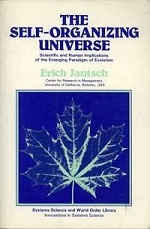
"Self-organization" is a rather ambiguous term: which or whose self is meant here? Shouldn't it actually be a "non-self"? For the process that produces complexity "all by itself" is called "self-organization" because nobody is organizing or planning it! The notion of self-organization can be interpreted spiritually: an inner Self or Spirit is driving the process (this interpretation is held by Ken Wilber, Marc Gafni and Andrew Cohen—I doubt if Erich Jantsch has gone down that road). It differs starkly form the more naturalistic accounts (Eric Chaisson, Dorion Sagan), which stress the non-intentional nature of the process. They claim, correctly in my opinion, that "self-organization" never happens without an external energy flow. This is the crucial point. It is not a mysterious "inner drive" or "intra-natural force" (Wilber) that causes complexity in nature to emerge. Without this supply of energy, nothing will happen on its own. Hurricanes don't "want" to become hurricane, they just arise under the right conditions (of certain energy and heat gradients). Life, like the weather system, exists in a permanent state of being "out-of-equilibrium", as long as energy is supplied. That's where the interesting things can happen. 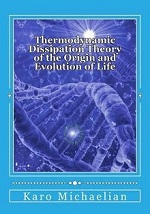
The expression "self-organization" contrasts nicely to the term "the dissipative universe" which I encountered in a recent book on entropy I have been reading, written by physicist Karo Michaelian: Thermodynamic Dissipation Theory of the Origin and Evolution of Life.[2] The idea is that entropy, or the universal tendency to produce disorder, otherwise known as the Second Law of Thermodynamics, and which reigns supreme in the universe, has also been instrumental in the creation and evolution of life. Stars burn up their energy, even if it takes billions of years, until they collapse in supernovae, neutronstars or black holes. The term "dissipation" has been popularized by Nobel Prize winner Ilya Prigogine, and refers to the fact the biological organisms live and grow by constantly dissipating energy. Michaelian argues for an unconventional theory about the origin of life in which UV-light—normally thought to be destructive to life—has played a key role in creating molecules such as RNA and DNA, which absorb this part of the spectrum exceptionally well and are crucial for all forms of life.[3] What is more, through this biological activity energy is dissipated more efficiently than would otherwise be the case. Self-organization in the service of dissipation! So which is it? Is the universe "winding up" or is it "winding down", as Wilber is fond is phrasing the dilemma? He strongly favors the first option as is evidenced by some of his remarks over the years bearing on this topic:
The closing of the gap between the physiosphere and the biosphere came precisely in the rather recent discovery of those subtler and originally hidden aspects of the material realm that, under certain circumstances, propel themselves into states of higher order, higher complexity, and higher organization. In other words, under certain circumstances matter will "wind itself up" into states of higher order, as when the water running down a drain suddenly ceases to be chaotic and forms a perfect funnel or whirlpool. Whenever material processes become very chaotic and "far from equilibrium," they tend under their own power to escape chaos by transforming it into a higher and more structured order—commonly called "order out of chaos."…
The material world is perfectly capable of winding itself up, long before the appearance of life, and thus the "self-winding" nature of matter itself sets the stage, or prepares the conditions, for the complex self-organization known as llfe.… The new sciences dealing with these "self-winding" or "self-organizing" systems are known collectively as the sciences of complexity—including General Systems Theory (Bertalanffy, Weiss), cybernetics (Wiener), nonequilibrium thermodynamics (Prigogine), cellular automata theory (von Neumann), catastrophe theory (Thom), autopoietic system theory (Maturana and Varela), dynamic systems theory (Shawn, Abraham), and chaos theories, among others. (Sex, Ecology, Spirituality, 1995, p. 13-14)
The Second Law of Thermodynamics tells us that in the real world, disorder always increases. Yet simple observation tells us that, in the real world, life creates order everywhere: the universe is winding up, not down. The revolutionary new understanding found in "chaos" and "complexity" theories maintains that the physical universe actually has an inherent tendency to create order... (A Theory of Everything, 2000, p. x)
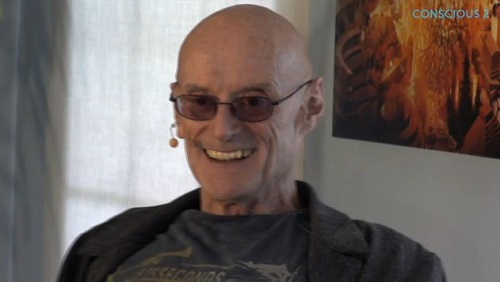
Ken Wilber: “The whole notion of the universe as 'running down' is ridiculous.”
Evolution itself is driven by the creation of increasing, holistic, increasing wholes, increasing unities. And the whole notion of the universe as 'running down' is ridiculous. I mean, it is NOT!
It started with the Big Bang with strings and quarks. Over tens of thousands of years quarks started to come together as sub-atomic particles. That's an increase in wholeness. And then thousands of years later sub-atomic particles started to come together as atoms. Another increase in wholeness. Thousands of years later these atoms come together and form molecules. Another huge leap in wholeness! And then in a staggering leap, at some point, dozens of very large molecules, just hanging around together, and a cell wall dropped around them, and a living cell emerged. Unbelievable! And then those cells became multi-cellular organisms, they were very simple at first, got more complex, added neurocords, added reptilian brain stems, added paleo-mammalian limbic systems, added neocortex... Ehm, THAT is a universe winding UP. It is not a universe winding DOWN. It is not a universe becoming more and more dispersed and separated and isolated. It is a universe coming together in higher and higher wholes. Until we finally come to the human brain, which has more synaptic connections than there are stars in the universe. ("Integral in Action with Ken Wilber", Conscious2, October 10th, 2015, 50:00-52:00 minutes in the video).
Ken Wilber seems to think the evolutionary growth to complexity somehow invalidates the Second Law.
Where Wilber in his earlier works still seemed to align himself with science, by acknowledging both that physical processes tend to "wind down", but that for some reasons still under investigation by science, life seems to "wind itself up" by the process of self-organization, in his later statements he seems to go so far as to deny the Second Law. We see him sliding from a semi-academic tone in Sex, Ecology, Spirituality to a more emotional and inspirational tone in later media expressions, easily jumping from life as an exceptional phenomenon to apodictic statements about the universe at large ("the universe coming together in higher and higher wholes"). In all his works he pictures evolution as an process driven by an "intra-natural" force towards complexity and consciousness, which he usually and metaphorically calls Eros. In his recent The Religion of Tomorrow (2018) Wilber is even more explicit. What drives evolution is the very Spirit of the universe, which "pulls us back home".[4] This too represents an extreme point of view within the complexity science landscape. The emergence of complexity in the cosmological and biological realms turns out to be much more... ehm, complex than this. Could it be that both views are true (the Second Law and the increased complexity) and that we need to hold them both in our minds together, to get a complete picture of the universe? Ken Wilber seems to think the evolutionary growth to complexity somehow invalidates the Second Law of Thermodynamics. A rather elementary and embarrassing mistake. A MODERN ORIGIN STORY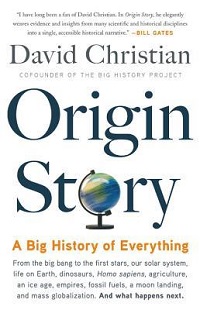
In a recent book by the Australian historian David Christian, Origin Story: A Big History of Everything (2018),[5] a more nuanced and believable treatment is given of the paradoxical relationship of evolution and entropy. Christian started the "Big History" movement in academia in the late eighties and the subject is currently taught in universities and graduate schools. Christian's TED lecture "The history of our world in 18 minutes" has been viewed over 8 million times.[6] He is also the initiator of the Bill Gates funded The Big History Project. The subtitle of the book is similar to Wilber's own A Brief History of Everything (1996) and A Theory of Everything (2000), and the genre has become popular these days. Wide-ranging and sometimes over-reaching narratives are brought forward from various angles to clarify our place in Nature. Yuval Noah Harari's Sapiens (2011) and Homo Deus (2015) come to mind.[7] Wilber's "everything" books are more psychological, with their focus on developmental psychology, with excursions to society, where Harari's focus is on the "useful fictions" humanity has devised, such as religions, money and industrial brands. David Christian's book is decidedly more scientific, since Big History is heavily based in astronomy and biology. Special attention is given to the energy flows that give rise to the various forms of complexity—cosmological, biological and cultural—which allows for the formulation of cross-domain principles that hold true across the domains of matter, life and mind/culture. Christian argues for this scientific focus in the following way. By losing our faith in religion, we have lost our sense of orientation: But many simply lost faith and conviction, and along with them, they lost their bearings, their sense of place in the universe. That loss of faith helps explain the pervasive anomie, the feeling of aimlessness, meaninglessness, and sometimes even despair that shaped so much literature, art, philosophy and scholarship in the twentieth century. (p. ix) How did we get here? Our modern origin story can help us get our bearings by placing human history within the much larger story of planet Earth and the universe as a whole. The view from the mountaintop can help us see what makes us different. (p. 159) Big History is a modernist way of restoring that lost sense of belonging, even if only to the material cosmos at large. I have written three essays on the interface of Big History and Integral Theory.[8] Basically, within the integral framework, Big History is an "externalistic" approch to atoms, stars, galaxies, planets and—us humans. In integral jargon it is a Right-Hand quadrants approach. It tells us "what happened", not "how we should live". For some that might best be left to religion. Perhaps. It is currently debated in the Big History community if it should open itself to value- and meaning-oriented perspectives. But this very hard-nosed empirical energy-perspective—which the unsympathetic reviewer for The Sunday Times judged "trite and boring"—is especially enlightening and complementary to the literature found in more idealist and spiritual circles. What role do energy and energy-flows actually play in the cosmic scheme of things? And even to today: isn't human culture a massive experiment in ever-increasing levels of energy-use (and mis-use), with global warming as most alarming result? More specifically, what role do energy flows play in the creation of complexity in nature? A homely example to explain entropy is the wind. Due to continuous influx of solar energy, high and low pressure areas are created in the atmosphere, resulting in ever-changing wind patters. Wind tends to flow from high to low pressure areas. It is as if the wind irresistably tries to restore balance in nature. Of course, the wind doesn't "try" anything, it is just the way things work in nature, but personifying it in that way is not altogether wrong. Without this input, the wind would gradually stop blowing. This state of balance is one of high entropy or disorder. The separation of high and low pressure areas is a kind of order. The Second Law of Thermodynamics states that disorder will always increase. Now wind energy can be put to use, to do work. A sailing boat makes perfect use of these differences in air pressure. The wind, however, doesn't create the boat—that's where the metaphor for the orgin of life seems to break down. But this seems true only at the macroscopic level. At the microscopic and molecular level, as Michaelian has demonstrated, the force of UV light really changes the way molecules behave, and enables them to process this energy ("degrade" it from high energy UV to low energy infra-red or heat) for the benefit of living organisms. "Energy flows through matter" is the paradigm of Big History when it comes to the explanation of the rise (and demise) of complexity in nature and culture. Big History usually defines a series of major "thresholds", each characterized by its own "regime", which we have passed through in our journey from the Big Bang to our current modern society. Here are Christian's milestones:
Source: *The Big History Project and **David Christian, Origin Story, p. 13-14.[9]
 Christian has an interesting take on the role of entropy in the universe, when he personifies it thus: If there is a bad guy in the modern origin story, it is surely entropy, the apparently universal tendency for structures to dissolve into randomness. Entropy is the loyal servant of the second law of thermodynamics. So if we think of entropy as a character in our story, we should imagine it as dissolute, lurking, careless of other's pain and suffering, not interested in looking you in the eye. Entropy is also very, very dangerous, and in the end it will get us all. Entropy stands at the finale of all origin stories. (p. 26) In this point of view, the more complex an entity is, the more energy is required to support it: It's as if entropy demands more energy from an entity if it tries to get more complex; more complex things have to find and manage larger and more elaborate flows of free energy. No wonder it's harder to make and maintain more complex things, and no wonder they usual break down faster than simpler things. This is an idea that runs right through the modern origin story and has a lot to tell us about modern human societies…. When information enters the picture, things get even more complex, and energy-intensive: Local environments are unstable so living organisms must constantly monitor their internal and external environments to detect significant changes. And as organisms increase in complexity, they need more and more information, because more complex structures have more moving parts and more links between their parts... At the end of his book, Christian is clear about who wins in the end, discussing the far future of our known universe: It will turn out that everything that seemed permanent in our universe was actually ephemeral. Maybe even space and time will turn out to be mere forms, mere wavelets in a larger multiverse. Entropy will have finally destroyed all structure and order." (p. 305) 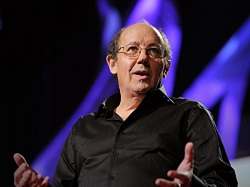 “We, as complex creatures, desperately need to know this story of how the universe creates complexity, despite the Second Law.” VIEW CHRISTIAN ON TED.COM “The History of the World in 18 Minutes” What makes this treatment more believable than Wilber's is that Christian is clearly aware of the paradox involved here. The Second Law reigns supreme in the universe, but that doesn't prevent order to arise in local areas given the right energy-conditions. Life is like paddling upstream. If we stop paddling, we go down. Wilber wants the river itself to run upstream. That's how he misses the paddling-part. And the river… So as long as we keep feeding ourselves with energy we can continue to grow and flourish, in a dimension that at first sight seems to defy all laws of nature. But birds (or Boeings!) don't contradict gravity when they take to the air, they just have found means (very energy-costly) to make use of the air. A silly Wilberesque comment would be:
The whole notion of gravity is ridiculous. Simple observation tells us that in the real world birds can fly!
Needless to say, Christian is much more grounded in these areas of science than Wilber. The Paradox of ComplexitySo there is actually no real contradiction here. A paradox, actually, is only an apparent contradiction, as the dictionary definitions clearly show.[10] Regarding the paradoxical relationship of entropy and evolution, several options present themselves. Let's sort them out one by one.
Especially positions #3 and #4 are counter-intuitive. Most creationists and spiritualists will use all the rhetoric they can muster to cast doubt on Nature's capacity to produce order and complexity "on its own", in a universe that is destined to end in heat death. On closer examination, however, this turns out to be a realistic possibility. There's a great irony here: where Wilber tries to close the gap between the domains of matter and life, but arguing for some life-like features of matter, these NET-theorists argue the opposite point of view: even life obeys the Second Law which reigns at the material domain! With this understanding, we might go back to the quotes from Wilber provided above. At first, Wilber is attempting to close the gap between the physiosphere ("the universe is winding down") and the biosphere, by pointing to signs of winding-up behavior in the domain of matter itself. He refers to "subtler and hidden aspects of the material realm" that "under certain circumstances" cause complexity to arise "under their own power", resulting in "a higher and more structured order". What is lacking from this analysis is a specification of the nature of these circumstances. Water running down a drain is a very weak example. What about hurricanes forming spontaneously in nature when the right environmental conditions are present? And what function do these hurricanes have when it comes to redistributing energy and heat gradients? We are never told by Wilber. This neglect of the impact of energy flows is a blind spot in Integral Theory. In the second quote, from the popular A Theory of Everything, we find to our astonishment that Wilber appeals to "simple observation", "in the real world" no less, which supposedly can overrule the hallowed Second Law of Thermodynamics!? But if science had followed "simple observation" it would never have gone very far. Simple observation "proves" that the Sun rises in the morning. For millennia this has been the received view, until science really started to investigate this issue. Contrary to common sense, the Earth turned out to revolve around the Sun, not the other way around. Even more embarrassing is Wilber's conclusion based on this observation: "the universe is winding up, not down." It does nothing of the sort. It only shows that biological evolution exhibits increased complexity—a fact that needs to be investigated and explained in naturalistic ways. And in the following sentence we are told that the "revolutionary new understanding found in 'chaos' and 'complexity' theories maintains that the physical universe actually has an inherent tendency to create order". Then it's a small step to postulate Spirit behind everything. It's a far cry from a scientific understanding of the world. Is there an inherent drive towards dinosaurs and hummingbirds? Not likely. But the worst statements show up in Wilber's 2015 talk about how the universe and its complexities came to be. The Second Law is brushed aside, even ridiculed—literally. The "coming together" of quarks, subatomic particles, atoms and molecules are presented as evidence for an inherent drive in nature, whereas they can more realistically be explained by the cooling of the universe. The early universe was simply too hot to allow for complex particles. But as soon as this cosmic temperature lowered to a certain degree, the clustering of particles happened on its own. Stars and galaxies, and even the chemical elements, were created by the sheer force of gravity. Glossing over the origin of living cells and multi-cellular organisms, for which many theories have been proposed, Wilber sees this, again as proof for an inherent drive in nature to produce such. In effect this is a non-explanation. And again, he mentions that all this proves that "the universe is winding up"…. What have these biological phenomena to do with the universe at large? This is very far removed from a scientific approach to understanding reality. The real paradox between a cooling and entropic universe on the one hand, and the magnificent growth in complexity in biological evolution on the other, is not grasped by Wilber at all. He tries to resolve the situation by making the biological metaphor of development paradigmatic for all of reality, even the cosmos as a whole. It is a shame that Ken Wilber can get away with his misreadings of evolutionary theory and complexity science for so long. The field of Big History can surely and effectively correct this lack of understanding of external reality. Is the integral community really content to drift off in romantic notions of spiritual and cultural development that are at variance with the fields of science touched on in this essay? Read and enjoy at least David Christian's Origin Story to get a healthy reality check. Our Fifteen Minutes of Geological Fame?We learn from this book that all major transformations in cosmological and biological or cultural evolution—Christian calls them "mega-innovations"—somehow had to do with energy flows: nuclear fusion in stars such as our sun, photosynthesis in bacteria and plants, agriculture and the use of fossil fuels in human societies. All have to do with sunlight and its capture, directly or indirectly. Photosynthesis and agriculture manage to capture sunlight that has left the sun only recently. But fossil fuels stored sunlight that had been collected over millions of years, in the form of coal, oil or gas, from the Carboniferous period (literally "coal-bearing", roughly between 360 and 300 million years ago), in which temperatures were high and vast forests covered the land. This was a game-changer that fueled the industrial revolution. More cheap energy was available than ever before. At the end of the nineteenth century it was discovered that carbon dioxide was a greenhouse gas... That brings us to the Anthropocene, a new geological period proclaimed by some to exist because of human impact on the earth's biosphere and atmosphere (and questioned by others, because geological periods usually take millions of years). Most of the animals now alive have been domesticated by humans and live in extremely large populations, often under dire conditions. Many wild species, for which we have found no use, have been (almost) exterminated by humans, including our nearest primate cousins (some speak of a nearing mass-extinction). Our carbon emissions have changed the atmosphere immensely, so this geological name seems justified, for better or worse. Christian gives us a wake-up call: Without really understanding what we are doing, we are fiddling with the biospheric thermostats that have kept Earth's surface within habitable temperatures for four billion years. (p. 274) There's an irony involved here: with all our massive buring of fossil fuels we are helping the Second Law tremendously in releasing the energy and heat stored in these materials. A lot of the extra energy must have paid for the taxes demanded by entropy from increasingly complex societies. Much of that energy did no productive work or was dissipated as heat or in pollution or waste or the destruction of war. It was doing entropy's work of degrading complex structures (p. 279) But even if we unknowingly align ourselves with these cosmic laws, we will destroy our own habitat if we can't restrain ourselves in the way we use available energy sources. Not only do we need to harvest more and more energy for a growing and modernizing world population (the "good Antropocene", Christian calls it), we also need to take care that the amount of heat and waste that is unavoidably produced during this process is kept to its minimum (the "bad Anthropocene"). Much will depend on our ingenuity in reaching that goal. A new Threshold 9 of a just and sustainable world might be around the corner. In fact, Christian suggests, the human thresholds 6 to 9 might be "a single threshold of increasing complexity culminating in the conscious management of an entire biosphere." (p. 300). Or else, we are just witnessing our own fifteen minutes of geological fame.
David Christian at the World Economic Forum, 21-24 January 2015
“According to the Second Law of Thermodynamics, the tendency of the Universe is for simplicity. There are no drivers for complexity… And since the universe tends to wind down, constant energy input is needed for complexity.” NOTES[1] Erich Jantsch, The Self-Organizing Universe: Scientific and Human Implications of the Emerging Paradigm of Evolution, Pergamon Press, 1980. [2] Karo Michaelian, Thermodynamic Dissipation Theory of the Origin and Evolution of Life, CreateSpace, 2016. [3] See also "Abiogenesis", section "Thermodynamic Dissipation", Wikipedia. [4] Frank Visser, "The Involution/Evolution Cosmology: Ken Wilber Holds On to an Outdated Scheme of Existence", www.integralworld.net (a review in 7 parts). [5] David Christian, Origin Story: A Big History of Everything, Little, Brown and Company, 2018. [6] David Christian, The history of our world in 18 minutes, TED2011, March 2011. From this video: "How does the universe create complexity given the law of entropy?... with great difficulty. And with every next step, the going gets tougher." [7] Yuval Noah Harari, Sapiens: A Brief History of Humankind, 2011; Homo Deus: A Brief History of Tomorrow, Vintage, 2015. [8] Frank Visser, "Integral Theory and the Big History Approach, A Comparative Introduction", May 2013; "Integral Theory and Cosmic Evolution, A Naturalistic Approach", December 2014 ; and "Big History and Integral Theory, Bill Bryson Meets Ken Wilber", July 2016 (which was presented at the International Big History Association Conference in Amsterdam, 2016), www.integralworld.net. [9] Note how in the well-known Big History graphic under Table 1, the colors of the rainbow are used, probably only for illustrative purposes. They range from warm to cool colors, and from lower to higher energy frequencies. Yellow seems missing from this palette, it would have been the perfect color for Threshold 4. The Solar System. Read more on color-models and their value. [10] Some dictionary definitions of "paradox" (emphasis mine): "a situation or statement that seems impossible or is difficult to understand because it contains two opposite facts or characteristics:" (Cambridge Dictionary). "a statement that is seemingly contradictory or opposed to common sense and yet is perhaps true" (Merriam Webster). "A paradox is a statement in which it seems that if one part of it is true, the other part of it cannot be true." (Collins). "A seemingly absurd or contradictory statement or proposition which when investigated may prove to be well founded or true." (Oxford) [11] For example, in the Epilogue of the recent comprehensive study The Origin and Nature of Life on Earth (2016) by Eric Smith and Harlod J. Morowitz, the authors conclude: We hope our introduction to these topics will begin to overturn the perception of life as a paradox of thermodynamics. The biosphere should be the system that will lead us to understand a new domain within thermodynamics—structurally richer than the equilibrium domain and so technically more complex—but conceptually a continuation and not a departure. (p. 609). |